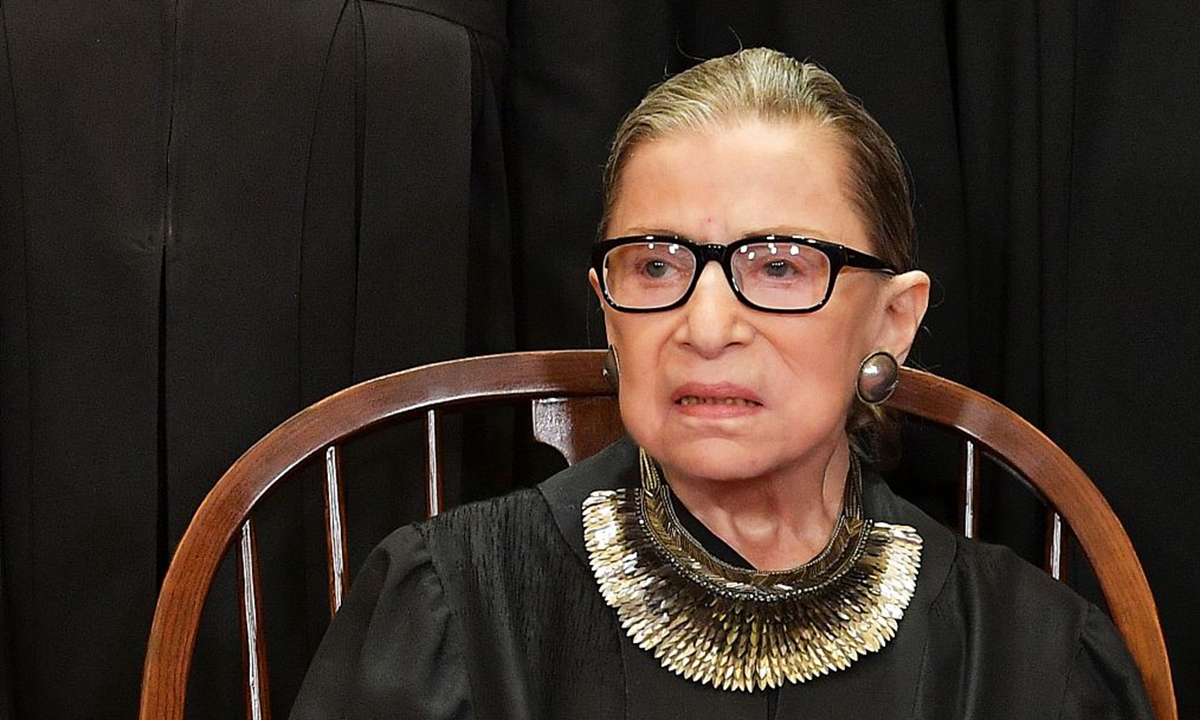New US Supreme Court justice race to intensify social divide
By Li Haidong Source: Global Times Published: 2020/9/19 18:11:49

Ruth Bader Ginsburg Photo:VCG
US Supreme Court justice Ruth Bader Ginsburg died on Friday. "Her death - less than seven weeks before Election Day - opens up a political fight over the future of the court," CNN reported.
After Ginsburg's death, incumbent US President Donald Trump will name a new justice to replace her. Trump will unsurprisingly put forward a conservative nominee, but it is still uncertain whether his nominee will finally sit on the bench.
The US Congress will vote before putting the nominee on the floor. Both chambers are busy focusing on the upcoming election, so even if Trump makes his choice, things would probably not go as he expected. The clash over the future of the US high court will be long term with plenty of uncertainties.
If Trump manages reelection on November 3, he will gain an upper hand in naming the next justice. But given the current proximity to the election, Congress will not approve the nomination as some Republicans expect. The Democrats will hinder the process, not to mention that some Republicans have also expressed unwillingness to vote to confirm a Supreme Court nominee before the election.
It can be certain that Trump will name his choice before the election, who will most likely be a conservative, shifting the court sharply to the right, so as to motivate his election base. With only about six weeks to the election, Trump won't delay his final nomination for too long, as he needs time to turn the tide.
The Politico reported on Friday Senate Majority Leader Mitch McConnell vowed that Trump's nominee to the Supreme Court will be put to the Senate floor for a vote, although Democrats have called on him to wait until after the election to put a nominee on the floor.
Ginsburg's passing has given Trump a good opportunity to influence the polls, but it is still not likely to see an October surprise.
It is not a benign scenario where the US high court tilts toward the liberals or the conservatives. The ideal format of the nine justices shall be 4-1-4. Now the conservatives take a 5-4 majority, and if it further goes to 6-3, then the imbalance will probably lead to a more conservative politics. At the time, the values of the entire American society, including customs, values, and mainstream cultural identity, will move toward conservatism. The pluralistic development of the US will be compromised.
The US is a diverse society. If the Supreme Court turns back to conservatism, there would be more of a split in terms of divisive social issues such as abortion rights, LGBT rights, healthcare, and guns.
It might be exaggerated to say that a further imbalance in the court will be disastrous for the US, but the political clash triggered by the nomination for next justice is surely reflecting the deep division in American society. Worse, the struggle surrounding the nomination will intensify these divisions rather than fix them.
In the short term, the game over the nomination for justice will to some extent impact and influence Americans' identification in values. But in the long run, what will become US values and what Americans will believe in will not simply be determined by merely a new justice on the bench.
The author is a professor of American studies at China Foreign Affairs University. opinion@globaltimes.com.cn
RELATED ARTICLES:
Posted in: VIEWPOINT